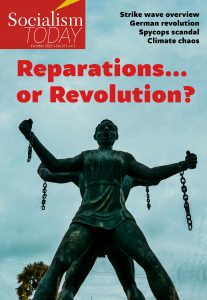
At the end of September Jake Sullivan, the US National Security Adviser, mused that “the Middle East region is quieter today than it has been in two decades”. Just a week later came the start of the fifth Israel-Gaza war, completely shattering that false perspective.
The October 7 deadly assault on Israel led by Gaza’s ruling party Hamas killed the highest number of Jewish people in a single day since the Holocaust and a number of foreign migrant workers, Israeli Arabs and Bedouin. In response the Israeli government declared a State of War that unleashed massive terror and destruction on Gaza, quickly escalating the death toll of Palestinians to beyond that of Israelis.
Israel’s most right-wing coalition government ever, under prime minister Benjamin Netanyahu, had been focusing on further steps towards annexation of the West Bank and had not prepared the Israeli military for the scale of the attack from Gaza. It had regarded the entrapment of over two million Palestinians behind the Gaza fence as a problem it could leave aside, and Gaza’s Hamas government as subdued and lacking in military capability.
Read more